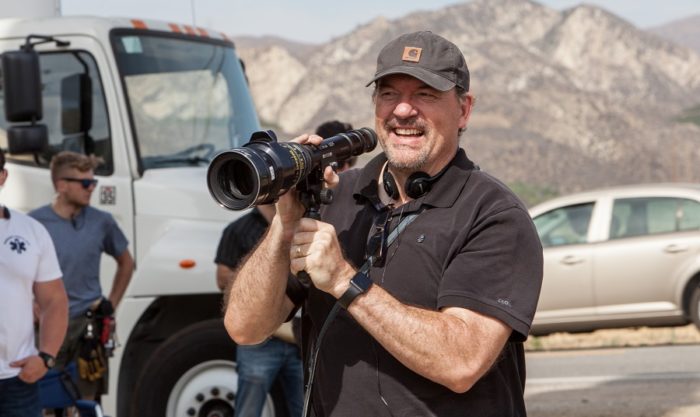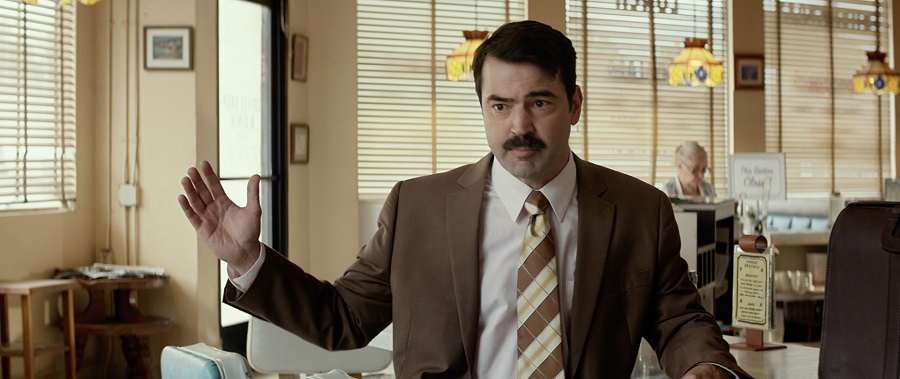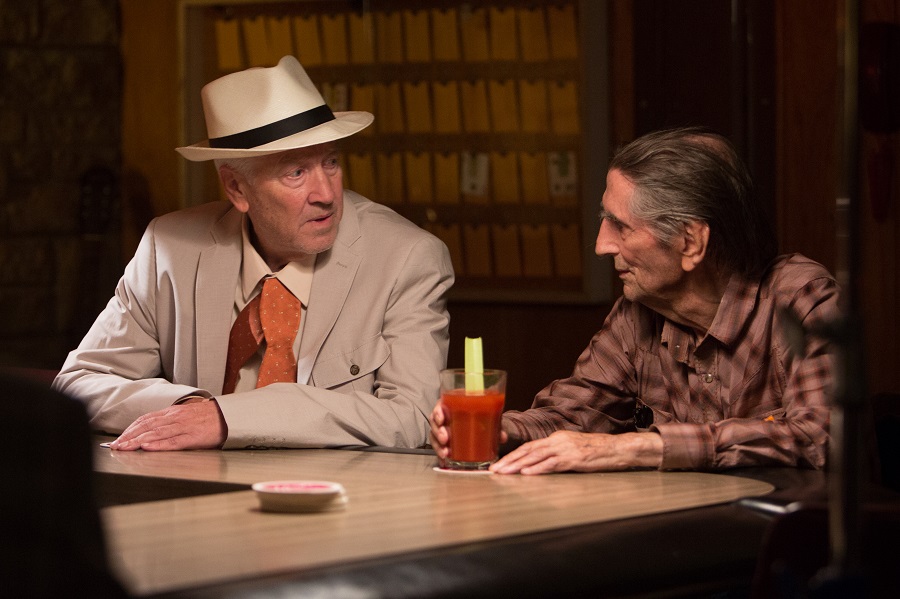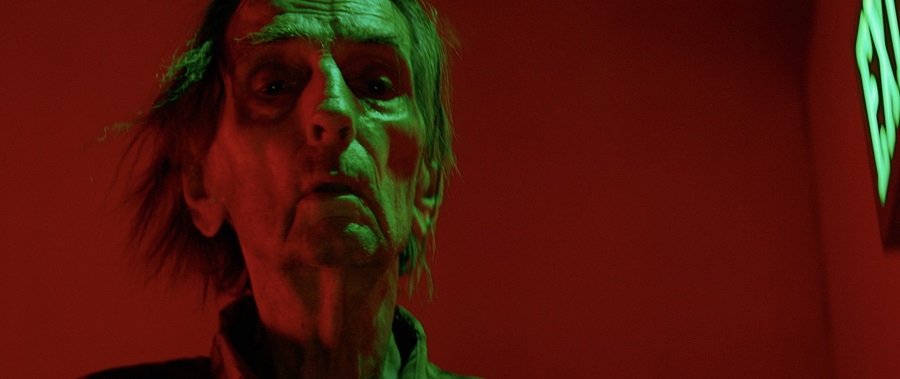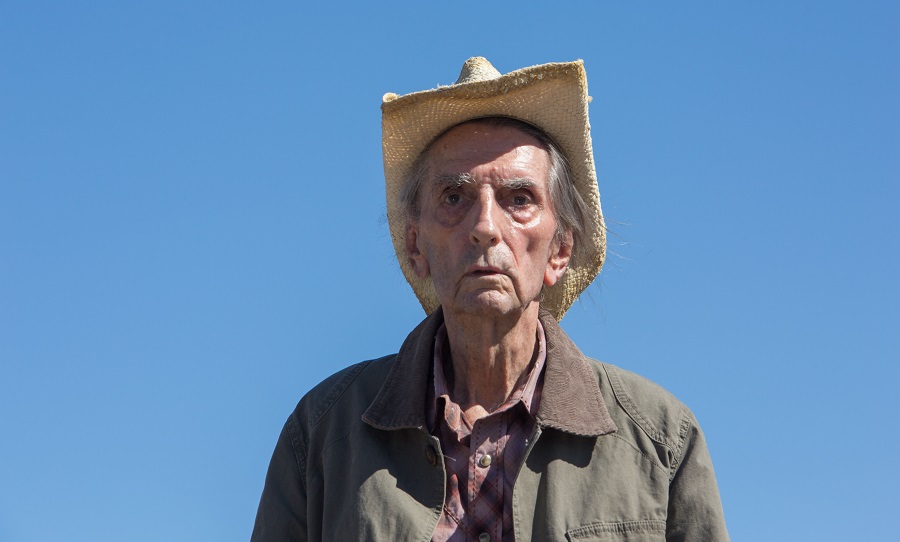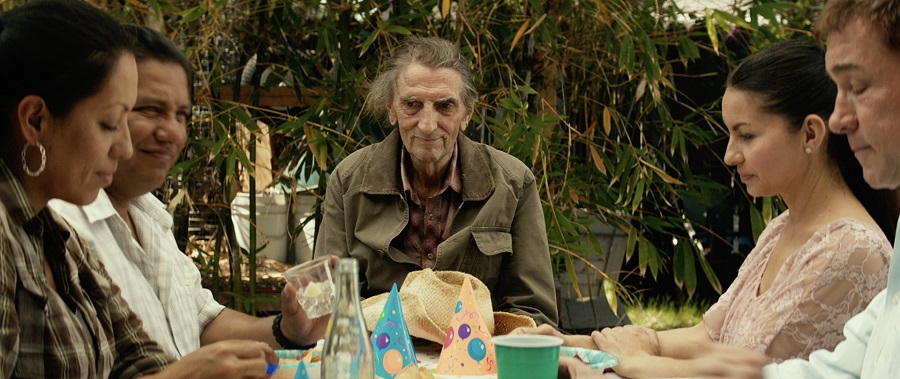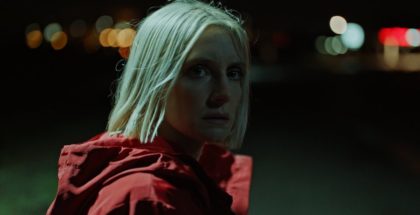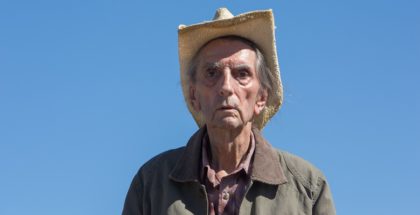Interview: John Carroll Lynch talks Lucky and Harry Dean Stanton
Matthew Turner | On 14, Sep 2018
This weekend marks the release of one of the last screen performances by legendary character actor Harry Dean Stanton. A meditation on mortality, loneliness, spirituality, and human connection, Lucky follows the spiritual journey of its eponymous hero, a cantankerous, self-reliant 90 year old atheist, and the quirky characters that inhabit the Arizona town where he lives.
Also starring David Lynch, Ron Livingston (The Conjuring), Ed Begley Jr.(St. Elsewhere), and Tom Skerritt (Alien, Top Gun, Contact), the film marks the directorial debut of John Carroll Lynch. Over his career, he has worked with such legendary filmmakers as the Coen Brothers (Fargo), David Fincher (Zodiac), Clint Eastwood (Gran Torino) and Martin Scorsese (Shutter Island). Now, as he moves behind the camera, we chat to him about the film, releasing day-and-date on VOD, and the legacy of his star, Stanton.
How did the project come about, first of all?
It started with the writers. They’d known Harry for a long time. Logan [Sparks] had been Harry’s assistant for quite a few years, Drago [Sumonja] had known Harry for a long time through his friend, Dabney Coleman. And they were driving back from doing some footage on a documentary they were working on, and both of them came up with this idea of Harry being kind of a guru at the edge of the desert. So they wrote the script and then Drago brought it to me at a coffee shop when I was in Los Angeles and he asked me if I would be interested in acting in the film first, and then a couple of months later they contacted me again and then asked me if I would be interested in directing the film. And I had been wanting to direct for a long time and I felt like I really could see this script and I was excited to have the opportunity. And we then went through the process of going through the script to try to focus the script towards an interior story of Lucky’s journey. That’s how it all began.
You say they originally approached you to play a part in the film. I’m guessing you’d have been maybe Ron Livingston’s character?
Well, that was one of two that they were asking me to consider. One was that and one was Joe, Barry Shabaka Henley’s character. I was happy with either one, but it felt to me like if I were going to do it would really be about spending time with Harry, and in my mind, spending four days with Harry was better than spending one day with Harry, because originally the well the Bobby Lawrence character [played by Ron Livingston] just had the one scene in the bar, he didn’t have the second scene. That came over the course of the rewrite as we were working on the script. But I’m glad that it turned out the way it did. After I was going to direct it, there was some intention of me being in the movie and then I just said no, it’s not worth it, if you can find somebody as good as Barry to play Joe, we should, and then I could just take on the job that I’d never done before.
The film is obviously the perfect tribute to both Harry Dean Stanton and his career. Was there any kind of awareness of that between the two of you on set?
Well, we never talked about it, but the producers and writers and I talked about it all the time. We understood that it was to some degree – I mean, we never thought of it as an elegy, because we didn’t have any intention for Harry to die, but it was inspired by Harry’s life and Harry’s view of life, and then it was, visually, of course, filled with images that are evocative of Harry’s career. And that we knew going in. But Harry and I never talked about that, we just talked about where Lucky was at any individual moment in the story. He didn’t really approach it as an elegy to himself – I don’t think that would have been valuable anyway – and he certainly had no intention of it.
I wondered if there was some awareness on his part that it might be his last film. He might have been planning to retire afterwards, for example.
Well, I mean Harry had retired several times over the last couple of years when he was alive. He had been offered lead roles in movies that did quite well when they cast someone else, and directors had pitched him projects of this size and scope for himself before, and basically he had told them, “it’s too much work, I’m not really interested in that”. He was much more interested, at the time the script came to him, in watching game shows and the Lakers and doing his crossword puzzles and going to see friends. And singing, he was always interested in singing. But this script had things in it that I think he agreed with and that he wanted to say out loud. And he also loved Logan and wanted to do it for him, to some degree. Mostly, my experience of him was that he never did anything he didn’t want to do. And he said yes to this, so something about it made it interesting to him.
How much of the film was scripted, how much of it was improvised or workshopped?
Absolutely none of the script was improv-ed, per se. Any individual line that was slightly altered because of performance, which happens to everybody – somebody uses a “with” instead of an “and” or a “but” instead of a “for”, or whatever would be – those kinds of changes that happen in the moment, but other than that it was almost entirely scripted. I think there are three improvs in the whole movie and none of them were by Harry. So we did go over and work on the script with him over the course of six Sundays before we started shooting. That was to get that out of the way, because we had such a limited amount of time and I wanted to make sure that Harry and I were on the same page about where the character was. So we had to kind of come to a shorthand, which we did. But his contribution to the script wasn’t really about “I wouldn’t say this” or “I want this moved someplace else”, so much as it was “Why am I saying this now?”, there was a lot of questions of why and that spoke to character and story and not to the writing. He approached it as an actor.
Had you known Harry personally for a long time? Had you worked together before?
Never worked with him, but met him about five or six years before we did the movie with my friend Drago at [Hollywood restaurant] Dan Tana’s with Dabney Coleman. They were lifelong friends. It was fun to meet Harry for the first time. I’m not sure if this is the first time I met him or not but I’ve always made it the first time, whether or not that’s accurate. He came in and we were sitting at Dabney’s corner table and Harry came in and he had his tequila, he had gone outside and smoked a cigarette and come back in and these two young women came in and said, “Excuse me, are you in Big Love?”, and he said, “Yes, yes I am”, and then they took pictures with him, and any time a woman spoke to him Harry immediately looked 40, it didn’t matter how old he was, he just looked 40 when he was talking to women. And meantime, they didn’t recognize Dabney at all, which delighted Harry and pissed Dabney off a little bit. So then when he sat back down after taking his picture, he turns to Dabney and goes, “You know, sometimes I forget how famous I am…” [Laughs] And Dabney could say nothing, could say nothing. He was stewing in his stare.
You have a lovely cameo, or, I guess extended cameo for David Lynch, who I assume is no relation?
No, no relation. It may feel like a cameo, or even an extended cameo, but it’s actually the second largest part in the film and it carries the only subplot in the movie. So it was a fairly large part and we were looking for someone who would complement Harry and actually we had offered it to a couple of people who were either too ill or too busy. And Harry asked Logan who we were thinking of and he told him and then he said, “Have you thought about David?” And Logan thought it was a good idea, we all thought it was a good idea, I thought it was great, I mean I had seen them together, I’d seen David act before and I’d seen him with Harry in Partly Fiction, the Sophie Huber documentary, and I knew that they had the right chemistry for those two characters. And so we went about the process of asking him, and he gave us as much time as we needed, which was quite generous, considering he was in post-production for Twin Peaks, so it was a really busy time for him. He brought such an innocence to the part, such a disarming honestly and such a love, of both the tortoise and Harry that it really creates a lovely relationship.
Did you employ a good tortoise wrangler?
We got our tortoises from Sonoran Desert Tortoise Rescue. There were eight who were brought out to the set. We did an extensive casting call, just there on set, choosing the one that would walk and that one would walk based on where we put strawberry juice. I wish all actors would respond to strawberry juice, but they don’t, they require more frontal lobe kind of descriptions, which I think is rightly so, but when it comes to the tortoise, that’s pretty much what we had to do. But I will say this, the tortoise didn’t always find the strawberry juice, so we had a lot of footage of the tortoise wrangler going out, picking up the tortoise, setting it back on the path, picking up the tortoise, setting it back on the path, picking up the tortoise, setting it back on the path. We had a lot of that.
So basically, a) you did your own tortoise wrangling, and b) you presumably have a greater appreciation for the tortoise wranglers of the world?
Not only did we have tortoise wranglers, we also had a turtle wrangler, we had a lot of animals. No animals were harmed in the making of this show, they were just fed.
Which lessons, if any, had you learned as a director, from the many directors you’d worked with in the past?
All of the directors that I worked with that I admire were great hosts, they created a positive weather on the set that allowed for a creative atmosphere. So that, I wanted to create for the people who I worked with. And along with that, they also had a strong sense of plan and vision, whether there were two of them or one of them. There was never a question, the sets that I really liked to work on, there was never a question of the overall vision. The dance floor was laid well, so you feel like you’re free to create on either side of that. I would also say the other thing that I find about the directors that I’ve worked with that I admire a great deal is that they leave the opportunity for collaboration open, and they’re able to say yes or no to an individual idea based on what the needs of the material are and not based on any ego. And those things I tried to employ, along with the extensive amount of material I’ve been in and watched, I really wanted to make sure that the movie had an ambitious visual landscape, because the material required it. And so, I’m not interested in talking heads as a director or really as an actor, I watched The Big Lebowski recently in the theatres, and so much of that movie is dialogue heavy, and yet the visual elements of the film, beyond the dream sequences and everything else, just the simple composition of a frame with John Goodman and Steve Buscemi and Jeff Bridges in it, the three of them, you know, four or five pages of dialogue are so delightful, and that’s the kind of strong compositional work that I’ve been inspired by, not only with people I’ve worked with, but also the other directors that I watch.
You mentioned that the film takes elements from previous roles in Harry’s career and reflects those, but were there any specific references, or films that had a direct influence on Lucky?
Peter Bogdanovich’s The Last Picture Show and Jim Jarmusch’s Mystery Train. Along with those, The Straight Story was something that I thought a lot about, because it has a similar structure in terms of the man falling and trying to come to terms with his frailty. And the fact that it has Harry in it, and it’s such a clean story, The Straight Story, he directs it so unlike any of his other films. and. And along with those, The Searchers, because of the vistas. Obviously, Wim Wenders – you can’t send Harry in the desert without thinking of Wim Wenders, so you’ve got to do your homework there. Those were the primary inspirational ones. We wanted to make sure that the movie, at the end of the day, slid onto your Blu-Ray shelf somewhere next to those movies.
I’m glad you mentioned Wim Wenders – I was going to ask about Paris, Texas…
And also, Wim Wenders, the colour he did, the boldness of the colour that he used in the film. The green wash in the doctor’s office, those kinds of things were certainly part of what we talked about, what [cinematographer Tim Suhrstedt] and I talked about.
Apart from David Lynch and Ron Livingston, there are a lot of non-famous faces. Was it important to the film to have predominantly non-famous faces?
When we were talking about making the cast of the movie, there was a lot of discussion about who would play these parts, and a lot of questions of whether or not we’d ask some of Harry’s more famous friends to come and play with Harry, because it was intended to be a party, to some degree, of Harry, for Harry, kind of like a retirement party, I guess, in a way. But it was really important to me and important to the other filmmakers involved that a person watching the movie wouldn’t need to know Harry in order to understand and enjoy the film. Lucky had to stand on his own. And to that to that end, if one starts adding a bunch of famous faces for a day or two, what happens is it starts to become a vanity project and not a movie, in my opinion. In that way, that was true, but I must say we were able to get a pretty amazing cast of heavy hitters who are, like me, mid career professionals, let’s just put it that way. I don’t know how many movies Barry Shabaka Henley’s been in, probably close to fifty, Beth Grant easily that many, along with Ed Begley, who’s worked for forty years. It was also enviable to have a script where the youngest speaking part is thirty eight years old [laughs]. It’s an old cast. And James Darren, another one who had been working both as an actor and director for since he played Moondoggie [in Gidget]. They’re amazing. It’s an amazing cast.
I was going to say, I thought you got the balance exactly right, between the bigger names like David, Ron and Ed, and then the smaller names. And I can understand the temptation to, say, have a younger waitress, who’s more famous, that sort of thing. And I’m glad that you didn’t do that.
I think Yvonne [Huff] did a wonderful job, and her age actually created a kind of poignancy, which a younger actor wouldn’t have had. And we considered and went out to younger people for that part and that’s what’s great about casting, sometimes you just get lucky. And we certainly did. Hugo Armstrong is another one, Hugo’s a tremendous actor, he’s a friend of – it was Rolodex casting to some degree, because we didn’t have a lot of time or money to go through the casting process so everybody’s basically one or two phone calls away. Tom Skerritt was the only one that didn’t have a direct relationship to somebody who contributed to the film and it was great to have an Alien reunion in the middle of the shoot.
You mentioned James Darren – how did he come to be on board? Also, you said he’s been directing – has he been steadily working under the radar all this time?
He’s had a series of interesting comebacks. He was a teen idol and then his film career kind of dipped and he started to do – he was not a singer by profession when he got those movies that he was singing in, so he started doing his own lounge act, which he did for a long time, and then he did T.J. Hooker and then he started directing television and then he directed television and then he went back to his lounge act, and then Ira Steven Behr, who was one of the producers of this movie remembered him and asked him to play a part on Deep Space Nine. And so he went back to acting and he continued to do his singing gigs twenty, thirty times a year. So when we were doing one of those Sundays of going up and working with Harry, Ira was on his way there and on Mulholland Drive, James Darren was broken down by the side of the road. And Ira pulled over it and said, “What the hell are you doing here?” and he goes, “I’m waiting for Triple A, what does it look like I’m doing?”, and Ira said, “You know what? I have this movie I’m producing – I want to send you the script and I want you to meet the director for this part of Paulie. Read it and call me on Monday.” And he called them and on Tuesday we had the meeting and on Wednesday he was in the movie. I mean, he came to mind because his car broke down. And that’s that’s not a bad way to get cast. I was once cast because I fell asleep on a couch in an advertising office while a friend of mine had a costume fitting there for a different set of commercials. And you know, that’s when you realize you can’t game this stuff out.
The Variety review of Lucky singles out James Darren and says that with a prevailing wind, this film could do for him what Jackie Brown did for Robert Forster.
Well, I would love to see that happen because I think he was tremendously good in this movie. He brought a kind of a warmth and grace, I would say, to the movie that was really special. He really knew this guy and he played him beautifully. I would love to see more of James’ work, Jimmy’s a heck of an actor, so if if he gets called more because of that, I’m sure he’d be interested in working. You know, obviously there’s a few things that Robert Forster had going for him in terms of Jackie Brown, two of the words were “Quentin” and “Tarantino”, so that helps a lot. But, you know, to whatever degree, if anybody calls me and asks me for a reference on Jimmy Darren, he’ll definitely get a positive reference.
What was the hardest thing to get right overall?
Following Lucky’s journey without words and making sure that the audience knew where Lucky was at any individual time in his heart and in his head, without telling them outright where he was in his heart and in his head. It’s a movie that leaves you alone, to make up the story of where he is on your own, and yet I had to think about if I were seeing this for the first time, where would I think he was and try to focus the material towards that journey. Because it’s an interior plot. A lot happens to Lucky, but it’s all in his head, and it’s not like a lot of movies about this subject, about the question of the fragility of life, where people take big swings, they go rob a bank or they jump from a plane or they go to see their long-lost lovers or their long-lost daughter, you know? He has to have that entire journey of coming to terms with his mortality and being connected to life in a different way, without ever leaving his community or changing his routine. And that required a lot of discipline from Harry and a lot of discipline from us, to make sure that the audience could understand where he was. And it’s been gratifying to be with audiences and to feel them be where we hoped they would be. That was the hardest thing to get right.
Do you have a favourite scene in the film?
They’re all my children. I love them all equally. I would say that the song is so beautiful. I mean, Harry’s voice was so beautiful. I love that birthday party scene, I think it’s a beautiful scene. It was beautifully written, it always felt good, and then the end of the movie, when he’s walking alone in the desert is also very powerful to me and that was a very powerful moment to shoot and it was literally on our last day of shooting. And close to the last shot was the end of the movie and his smile and that will always be special to me just because of the day that it was.
Did you cut anything out that you were sorry to lose?
No. I didn’t cut anything out that I was sorry to lose – I would have liked things that I shot to be in the movie. The movie starts telling you what it needs and there were so many sequences, two or three in particular, that it was just like, “oh we don’t need these, they’re of no value, the audience will be in a different headspace completely”, and that made itself pretty clear. Of course, there are wishes about – what’s the right word – editing a movie is watching the daily regrets of what you didn’t get right over and over and over and over again, so I certainly learned a lot about that, that next time I shoot a movie, I’ll have a strong Plan A and then another Plan B, and then a Plan C, if I can, on every scene. Because when Plan A didn’t work in certain circumstances, because of my failure to get what I needed, Plan B was sometimes hard to find. But we did find it.
I love the song Red River Valley. Was that scripted as well, or was it more like, ‘What can Harry do on the harmonica’?
Harry can do anything on the harmonica. He could do anything you wanted on the harmonica, pretty much. But Red River was in the script to begin with.
Why that specific song choice then?
I think it’s evocative of the environment. Also, there’s a melancholy to it. Obviously a nostalgia, too, since the phrase over and over again is “Remember the Red River Valley”. It’s also kind of an ironic song, considering you’re in the desert, there is no red river anywhere in the desert. I think it just always felt that it had the right pace for the movie. It felt like it matched the character well as well. There’s a lot of reasons why it worked for me. And then to go up and have Harry play it, and give us four or five different versions to play with in the film, that was a fun day. He never seemed to tire of playing the harmonica. He could have probably played it for another hour for us and I’d have been just fine with that.
That would have been one heck of a DVD extra.
Yeah, it would have been. I should have thought of that.
Lucky’s going to be on VOD alongside its theatrical release. How important do you think Video On Demand is to the future of independent filmmaking?
[Laughs] Video On Demand IS the future. I’m in a movie called The Highwaymen that’s coming out in December – it’s with Kevin Costner, Woody Harrelson, Kathy Bates and Kim Dickens and that’s going to go straight to Netflix, it’s not going to pass Go, it’s never going to show in the theatres. There’s another movie I did with Paul Giamatti and Kathryn Hahn recently, Private Life, where once again the filmmakers found a deal with – I think it’s Netflix there too. So Video On Demand IS the future of independent filmmaking. The value of that for the filmmaker that is trusted with the material, that is trusted with the money, is they’re really free to create what they want, there’s not a lot of pressure to conform to an exhibitor’s standards, which is exciting. The difficulty is that it can feel like it’s thrown onto a queue and you never get a sense of how the audience responded to it. So it might feel like you’re just creating kind of in a void, I think. I’ll let you know once that happens. But this movie particularly, it was really important that we find a distributor that was committed to a theatrical release, because the movie has a theatrical release vibe and Harry’s a theatrical release guy. And gratefully, we did find that in every circumstance, people wanted to put this out in a movie theatre first.
You said you watch a lot of movies earlier, are you a VOD viewer yourself?
I stream almost everything now. This year, I’ve opted to ask the Academy to please stop sending me DVDs, because I travel so much, it’s very difficult. I’m here in Pittsburgh and one of my boxes has about eight hundred DVDs in it and I think it’s time that I stopped wasting the planet’s resources for that, I’ll just watch them on Video On Demand and streaming. So I watch a lot of FilmStruck, I watch a lot of TCM wben I have cable. I watch a lot of Netflix. I follow a lot of Hulu and CBS All Access, that’s what I primarily watch.
So what have you been watching and enjoying recently?
I started watching Castle Rock on Hulu, which is tremendous. I watched Dinner At Eight the other day, the 1933 movie with the Barrymores. That’s a quite a surprise, you know. At the beginning it feels like it’s going to turn into a comedy, but it’s such a melodrama, it’s incredible. I was surprised by that movie. And really, Jean Harlow, forget it, man. I mean she was so talented, what a loss, you know? What a loss to such a short career. She was incredible. She could be so vicious and so funny at the same time, it was tremendous.
It’s fair to say your tastes are quite wide-ranging then?
Yeah, I’m a guy who likes the phrase “Tell me a story”. I’m an omnivore when it comes to that stuff. I watch popcorn movies and I watch arthouse movies and I watch a lot of streaming television, I watch a lot of different things, but whenever I find myself with time, I’ll turn on Turner Classic Movies or FilmStruck and watch movies from the studio era.
Finally, do you have a next project? Are you planning to direct again, and if so, do you have any idea of what that might be, or are you looking for your next project?
I’m looking at writing right now, so I have friends who have some material that I’m interested in. And I’ve also discussed some other material. I know that a commitment to independent film material is a five year commitment, so it’s not necessarily everything you read, as much as you love it, you want to give five years to it, but I now know what it takes to get it done and that’s your minimum commitment if you’re successful. Likely, if it’s a difficult business model, it will be more like eight to ten, and so you have to have a wide variety of things in the pipeline. I’m trying to use Robert Altman’s advice of producing movies is like cooking, just keep everything on the stove and wait for something to boil. And I think that that’s true, I’ve got three or four things that I want to get on the stove and we’ll see which one boils first.
Lucky is available to watch online on Amazon Prime Video as part of a Prime membership or a £5.99 monthly subscription. It is also available now on BFI Player, as part of a £4.99 monthly subscription.


